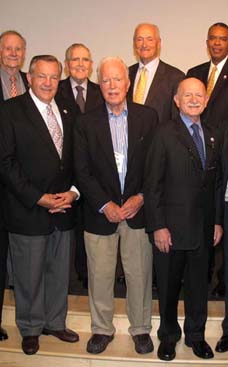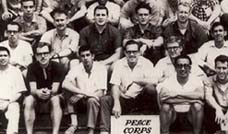
A couple of days after arriving in Botswana, my wife and I were matched with a family that we lived with for 2 months. This is the time most trainees enter the world of pit latrines and hand-washing clothes. The family helped teach us the local language, fed/taught us how to cook traditional food, and took us to cultural events like weddings to make sure we were adjusting to the new country. This is typically a time for cross-cultural exchange, as we taught them about America and cooked delicacies like grilled cheese. The family was also amused by my changing hairstyles, including a mo-hawk and changing facial hair, including lightning blot sideburns into a handlebar mustache. Peace Corps provides compensation for electricity, gas and gives each family a food basket, as a token of thanks for their hospitality. Peace Corps also meets with families to monitor problems and resolve any issues. The experience we had with our family was amazing, and to this day, they don't hesitate to refer to us as brother/sister, son/daughter, cousin or whatever fits. Not everyone has it as lucky as we did. Much like every family there can be some major problems and different personalities. Awkward moments of silence can and do happen. Home-stay definitely covered most of the cultural norms of the country, but there is always more to learn. Some of the issues volunteers care about most are how they will be treated in their village, what's normal, what's acceptable, and when is something considered rude. It was definitely a cultural shock to walk down the street next to a guy balancing a cow head inside an empty cardboard box on his own head, while also being offered chicken feet, chicken heads, or worms -- but that's part of the excitement!
Botswana Peace Corps Volunteer Ross Szabo writes: What to Expect in Peace Corps Pre-Service Training
What to Expect in Peace Corps Pre-Service Training
Posted: 05/ 7/11 01:07 PM ET
Every employer requires some type of training before the official job begins. When I was 16, I vaguely remember my cousins showing me how to correctly lift furniture before throwing me to the wolves (a.k.a. the 300-pound entertainment centers). I also remember damaging too many poles and TVs with a forklift before I got my certification when I was 20. And I'll never forget the embarrassing trial and error periods as I first started presenting to high school assemblies when I worked for a mental health awareness organization.
Whether it's the probation period for greeters at Wal-Mart or learning the ropes as a corporate lawyer, training is inevitable.
Throughout all of those training experiences I kept thinking, "Ok. I am good. Just let me start my job now." I went through a lot of different experiences from the time I decided to join the Peace Corps until I got to Botswana. After being in Botswana I was eager to instantly become a volunteer and get to a village, but the Peace Corps requires a 2-3 month training period before you officially become a volunteer. They do this for good reasons. Much like any job, there's a lot to know before you begin. Here's a rundown of the key components of pre-service training:
Homestay: A couple of days after arriving in Botswana, my wife and I were matched with a family that we lived with for 2 months. This is the time most trainees enter the world of pit latrines and hand-washing clothes. The family helped teach us the local language, fed/taught us how to cook traditional food, and took us to cultural events like weddings to make sure we were adjusting to the new country. This is typically a time for cross-cultural exchange, as we taught them about America and cooked delicacies like grilled cheese. The family was also amused by my changing hairstyles, including a mo-hawk and changing facial hair, including lightning blot sideburns into a handlebar mustache.
Peace Corps provides compensation for electricity, gas and gives each family a food basket, as a token of thanks for their hospitality. Peace Corps also meets with families to monitor problems and resolve any issues. The experience we had with our family was amazing, and to this day, they don't hesitate to refer to us as brother/sister, son/daughter, cousin or whatever fits. Not everyone has it as lucky as we did. Much like every family there can be some major problems and different personalities. Awkward moments of silence can and do happen.
Language: Needless to say, no matter where you are in the world, it helps to speak the local language. Peace Corps hires locals to teach the trainees. The teachers are called Language and Cross-Cultural Facilitators, and that is an understatement; they have to deal with a lot of personal and somewhat uncomfortable questions in order to help trainees learn as much as they can about the culture. We typically had about four hours of language class each day. In some countries fluency is really important in order to do quality work. In Botswana the official government language is English, but Setswana is most often used.
Programs: Peace Corps has a variety of volunteer opportunities: Education, youth outreach, community development; business development; environment; agriculture; health; HIV/AIDS; information technology; and food security. During training we learned from the people working in the fields we would be entering, as well as from Peace Corps in-country staff. The projects volunteers take on in their villages vary, but the same rules generally apply.
The government of each country that has Peace Corps volunteers has to request them to work on specific issues. The issues vary from country to country. The Peace Corps pulled out of Botswana in 1997 for various reasons, but returned in 2003 solely to work on different aspects of HIV/AIDS. Botswana has the second highest HIV/AIDS rate in the world. During training we learned about the biology, history, transmission, successes and failures for awareness and behavior change for HIV/AIDS.
Culture: Home-stay definitely covered most of the cultural norms of the country, but there is always more to learn. Some of the issues volunteers care about most are how they will be treated in their village, what's normal, what's acceptable, and when is something considered rude. It was definitely a cultural shock to walk down the street next to a guy balancing a cow head inside an empty cardboard box on his own head, while also being offered chicken feet, chicken heads, or worms -- but that's part of the excitement!
Rules: What would any job be without a fancy handbook and some rules? Each country has its own variation of the rules. In Botswana we learned what will get us sent home immediately, what's frowned upon, and what's ok. I haven't had a job where I agreed with everything that my employer wants me to do, and that is true with the Peace Corps too. However, I knew this when I signed up, and I could spend my 2 years uselessly focusing on the smaller pieces I don't like or I could continue to try and make a difference in our shared vision. I'll be honest -- there are times when I spend hours on the former, but most of my service is embracing the latter.
Mentors: Towards the middle of training each trainee is sent to "shadow" a current volunteer. The goal is to show a trainee what kind of projects he/she may be able to do and learn more from a firsthand source. It also feels good to speak English, get some home-cooked American food if possible, as well as get out of the training site and home-stay.
Site Placement: Towards the end of training each trainee finds out where they will be living for two years. One of the teachers in my training called this day, "the day of tears." I asked if people cry because they are happy and he said, "They are not tears of joy." Some people can be upset with placement for a variety of reasons, but they usually get over it. One week after finding out where the site placement is, the trainees go to the site for a couple of days to make a lot of quick introductions and make sure their housing situation is ok.
Swearing In: At the end of pre-service training, trainees who have made it are sworn in to become an official U.S. Peace Corps volunteer, and then they begin their 2 years of service! Our ceremony included the village chief, US Ambassador, Country Director, some beautiful singing and some tears as we recited the Peace Corps oath of service. After the ceremony I said goodbye to the friends I had made over the past 2 months, moved to my new village, and started just about every one of these items listed above all over again!
This year is the 50th anniversary of the Peace Corps. To honor this occasion, I will be writing blogs about my experiences as a currently-serving volunteer. It would be impossible to capture the unique experiences of all 200,000-plus volunteers that have served since the Peace Corps started in 1961. However, I am hoping to provide more insight into what a volunteer goes through from the time they decide to apply until they get to the country they are serving and all the funny, somber and moving stories until the day they leave.
















